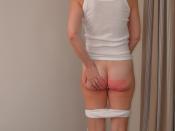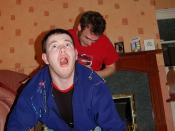Spanking does nothing to teach a child to develop inner discipline. A child's focus is on the spanking itself, not on a review of the behavior that led to it. After a spanking, a child does not sit in his room and think, "Gee, I sure goofed. But I really learned something. Next time I'll behave." Instead a child is typically thinking, "It's not fair! She doesn't understand! I hate her." Another problem with spanking is that spanking is seen as punishment for a crime, payment for a debt. In other words, once paid, they have a clean slate. Spanking gets in the way of allowing a child to develop a conscience. The guilt that follows misbehavior is a prime motivator for change. Spanking takes away the guilt, because the crime has been paid for.
A harmful side effect of spanking is that it makes the parent feel better. When we get angry, we move into the "fight or flight" mode.
Our adrenaline increases, and we have a primitive need to strike out. Hitting releases this negative energy and helps us feel better. But even a minor spanking can escalate into major abuse. Parents have reported that during the heat of the moment it's hard to stop hitting, and some say that they don't even realize how hard they've hit until they see the bruise.
Spanking gets in the way of a healthy parent-child relationship. Children look up to their parents as protectors, teachers and guides. When a parent breaks that pattern by hitting a child, the relationship suffers.
Positive parenting and alternative forms of discipline reinforce the values we want children to learn, without physical punishments. Parents can use positive discipline, which involves defining acceptable behavior and reasonable consequences for kids that break the rules. Discipline gives children the...


